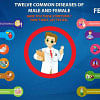Coronary heart disease – things you must know

Cardiovascular disease (CVD) is the number one cause of death globally. Study shows that with certain precautions, one can significantly lower the risk of having a heart attack. A description of the causes, symptoms, preventive measures and other important facts about heart diseases has been provided below.
What are heart diseases?
Heart disease or cardiovascular disease (CVD) is a broad term that describes the different diseases and conditions affecting the heart, and blood vessels. They include coronary heart diseases, strokes, aneurysms, rheumatic heart disease, thrombosis, arrhythmia, angina, ischemia, heart failures, cardiomyopathy, etc.
Am I at risk of developing CVD? – the risk factors
A risk factor is defined as "something that increases the risk", especially something that makes a person more likely to get a particular disease or condition.
There are many risk factors involved in CVD, which can be categorised into two groups: behavioural risk factors and biomedical risk factors.
Behavioural risk factors are modifiable and include smoking, a poor diet heavy in added sugars, fats, and sodium (salt), lack of any physical activity and exertion, and heavy alcohol consumption.
Biomedical risk factors are high blood pressure or hypertension, high cholesterol, high blood lipids, diabetes, and obesity.
Other risk factors include a family history of cardiovascular disease (CVD) and genetics, age, sex, depression, emotional stress, inflammatory diseases like rheumatoid arthritis, rheumatic fever, poor dental health, etc.
Symptoms of different types of cardiovascular diseases
As we all know, high blood pressure is the silent killer as people who have hypertension do not usually have symptoms. Often a heart attack or a stroke is the first symptom of any underlying cardiovascular disease (CVD). Overall, the symptoms of heart diseases are more or less the same with some variation depending on the disease.
Some common symptoms of heart diseases are chest pain, chest discomfort/heaviness/pressure, shortness of breath, palpitations, faster heartbeat, dizziness, sweating, nausea, pain or discomfort in the jaw, shoulders, arms, neck, back, etc.
Can I prevent heart diseases from happening to me?
Yes, you can definitely take preventive measures to lower your risk of heart disease. As mentioned previously, taking action to modify the behavioural risk factors can significantly reduce your chances of developing cardiovascular diseases. Some ways have been stated below —
Quit smoking
Smoking drastically raises the chances of developing atherosclerosis or plaque in the blood vessels, which subsequently increases your chances of developing cardiovascular diseases. So, it is quintessential to avoid smoking and to quit smoking if you are already a smoker.
Eat a balanced diet
Make sure your diet is free of added sugars, saturated fats, trans fats, and high sodium content. Reduce your salt and sugar intake. Swap your simple carbohydrate for more fibre enriched and whole-grain alternatives. Make sure your diet includes all the food groups and is filled with fresh fruits and vegetables.
Try to cut down your red meat consumption and opt for oily fish enriched with omega-3 fatty acids as your source of animal protein.
Exercise is a must to maintain a healthy weight
Exercise will help you to control your blood cholesterol, body fats, and weight. It is imperative that you undertake at least 30 minutes of moderate-intensity physical activity and exertion most days of the week.
Brisk walking, cycling, weight training, resistance training, cardio exercises, etc. Shedding the extra weight is also needed to drastically reduce your chances of developing cardiovascular disease.
Control stress
Although this might be considered a hackneyed cliché given our busy and hectic lives, controlling stress is important for the well-being of both your physical and mental health. Practice techniques to manage and process stress in a healthy way, and seek professional help and counselling if needed. Try to get sufficient sleep, and spend time with your loved ones.
In a nutshell, take an active approach to handle stress rather than putting it on the backburner.
Manage other health conditions
If you have other health conditions like diabetes, obesity, high cholesterol, and high blood pressure, work with a doctor to manage these conditions. The detrimental effects of most of these conditions can be kept at bay if managed well with proper treatment, medications, and lifestyle changes.
Practice good hygiene
Hygiene, especially dental hygiene plays a very important role in keeping heart diseases at bay. If your teeth and gums are not healthy, the germs can enter the bloodstream, reaching the heart and causing endocarditis. So, it is very important that you practice good hygiene.
As heart disease risk increases among the population with the increase in average life expectancy, it is important that you arm yourself with knowledge of cardiovascular diseases and take preventive measures to maintain a healthy, low-risk life.

 For all latest news, follow The Daily Star's Google News channel.
For all latest news, follow The Daily Star's Google News channel. 








Comments